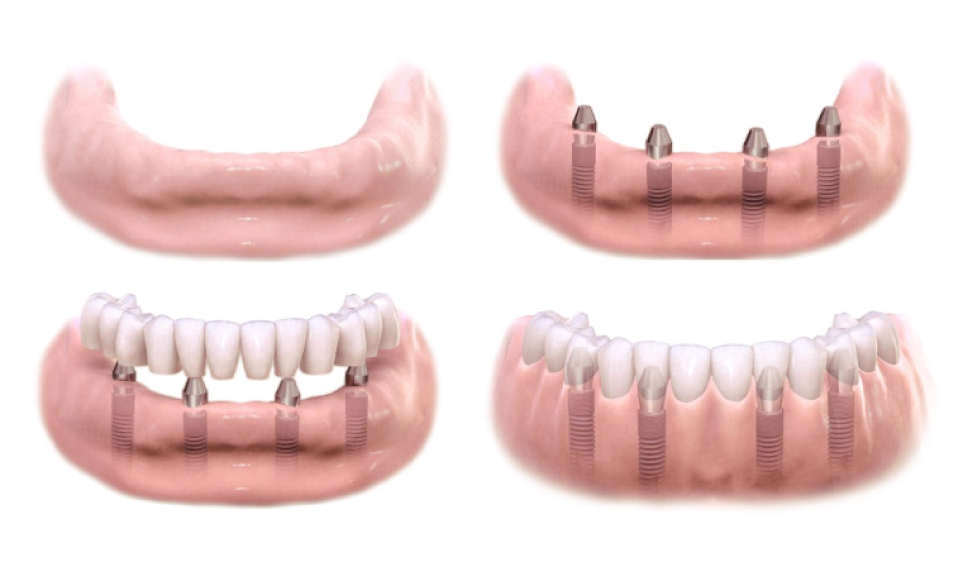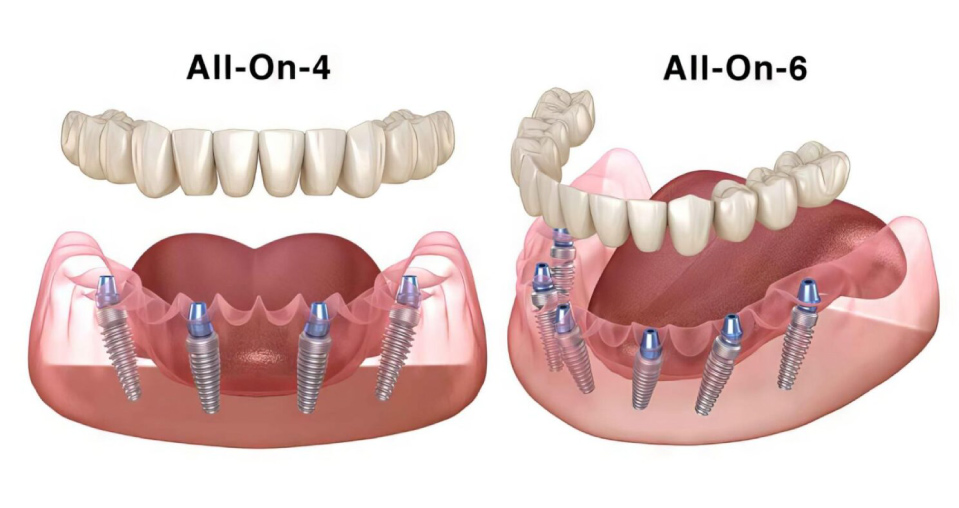Living with severe tooth loss can make everyday tasks like eating, speaking, and smiling difficult. For people who have lost most or all of their teeth, finding a fixed and reliable solution is important not just for function, but also for self-confidence and overall quality of life.
All on 4 dental implants offer a modern alternative to traditional dentures by using four implants to support a full arch of teeth. This method provides strong, natural-looking results and is often suitable even for patients with low bone volume.
In the sections that follow, we explain how the All on 4 procedure works, who it is for, what recovery looks like, how much it costs, and what makes Turkey a popular choice for full-mouth implant treatment.
All on 4 is an advanced dental implant solution designed to restore a full arch of missing teeth with just four implants strategically placed in the jaw. Unlike traditional implants, which may require six to eight implants per arch, this technique relies on just four well-angled implants to support a fixed full-arch prosthesis.
The key to its success lies in the placement: two implants are inserted vertically in the front of the jaw, where bone density is usually higher, while the two implants at the back are tilted at an angle. This angled positioning increases stability and optimizes contact with the existing bone, often eliminating the need for bone grafting procedures—even in patients who have experienced bone loss.
This makes All on 4 a practical and efficient alternative for those who would otherwise not qualify for traditional implants due to low bone volume. The fixed prosthetic teeth attached to the implants are custom-made to mimic the look and function of natural teeth, allowing patients to eat, speak, and smile with confidence.
Ideal candidates include patients who:
The concept of “Turkey teeth” has been widely discussed online. For clarity on what it really means and how it differs from procedures like All on 4, read our blog What Are Turkey Teeth?.
All on 4 implants are becoming the go-to solution for full-arch rehabilitation—and for good reason. Here’s what sets them apart:

The treatment is typically done in two main phases: the surgical stage and the prosthetic stage.
The procedure is performed under local anesthesia, and many clinics, including MCAN Dental, offer conscious sedation for patient comfort. While the surgery itself is not painful, it’s normal to experience:
These symptoms typically subside within a few days and can be managed with prescribed pain relief and ice packs. Patients often report less discomfort than expected.
The timeline can vary based on the patient’s oral health and whether immediate loading is used. Here’s a general overview:
| Phase | Timeframe |
|---|---|
| Consultation & planning | 1–2 days (can be done remotely) |
| Implant surgery | 1 day |
| Temporary prosthesis | Same day or within 48 hours |
| Healing period | 3–6 months |
| Final prosthesis placement | After full osseointegration |
Prices for All on 4 treatment can vary significantly between countries. Below is a comparison:
| Country | Estimated Cost per Arch |
|---|---|
| United Kingdom | £12,000 – £16,000 |
| United States | $20,000 – $28,000 |
| Turkey | £3,500 – £5,500 |
What’s typically included in Turkey:
Turkey offers high-quality care at a significantly lower price due to lower operational costs, not lower standards. MCAN Dental, for example, uses the same globally recognized implant brands and technologies as clinics in the UK and US. For a broader comparison of implant pricing across procedures and regions, you may also find our article Full Set of Teeth Implants Cost: Turkey vs UK helpful.
MCAN Dental has extensive experience welcoming international patients. The process is designed to be easy and stress-free:
While you’re receiving top-tier dental care, you’ll also have the opportunity to enjoy Istanbul’s culture, cuisine, and hospitality—many patients even combine their trip with sightseeing or a short holiday. If you’re new to the idea of seeking dental care abroad, take a look at A Complete Guide to Dental Tourism for a detailed overview of how to plan and what to expect.

Both treatments offer full-arch restorations, but there are a few key differences:
| Feature | All on 4 | All-on-6 |
|---|---|---|
| Number of implants | 4 per arch | 6 per arch |
| Stability | High | Even higher (more support) |
| Bone requirement | Less bone needed | Requires more bone volume |
| Cost | Lower | Slightly higher |
| Recommended for | Moderate bone loss | Higher bite force or density |
Your dentist will recommend the best option based on bone density, bite force, and long-term durability goals.
Good hygiene is essential for the longevity of your implants. While you don’t remove All on 4 prosthetics like traditional dentures, they still require thorough daily cleaning.
Daily Care Tips:
The transformation goes far beyond the mouth. Many patients report significant improvements in confidence, social comfort, and emotional well-being after switching from dentures or missing teeth to All on 4 implants.
They can:
After surgery, you’ll need to follow a soft-food diet for the first few weeks to protect the healing implants. Gradually, as healing progresses:
Your dentist will provide custom dietary guidance based on your healing progress.

MCAN Dental combines advanced dental technology with a patient-first philosophy to deliver exceptional results in implant dentistry. As a leading provider of dental implant in Turkey solutions, MCAN Dental is trusted by patients from around the world seeking high-quality, long-lasting treatment.
With a proven track record and hundreds of satisfied patients, MCAN Dental offers a trusted, affordable pathway to a permanent, beautiful smile.